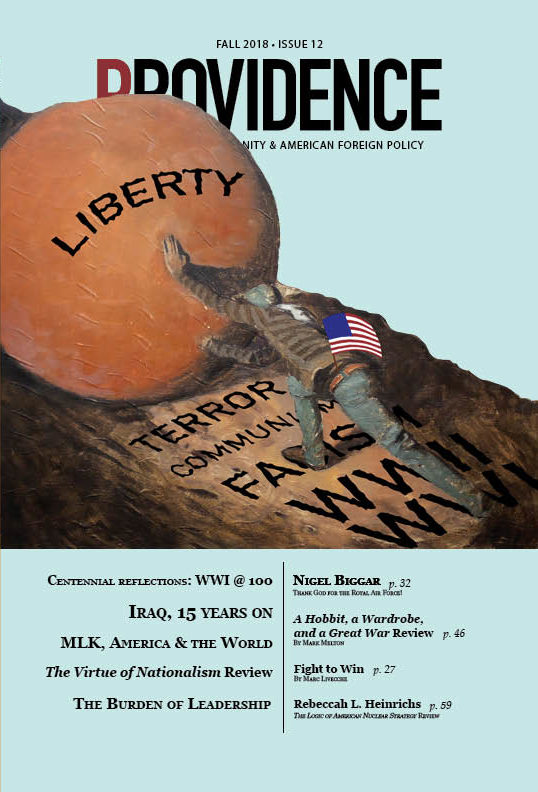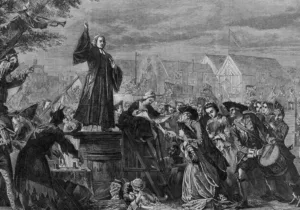We need a theological critique of American nationalism and the way it shapes the American foreign policy. Such a work must be theologically grounded but also historically informed and politically aware. Peter Leithart’s book Between Babel and Beast: America and Empires in Biblical Perspective meets the first criterion but fails on the second. The first third of Between Babel and Beast is an excellent work of political theology analyzing how the Bible treats different forms of polity. The rest is an attempt at critiquing the United States’ foreign policy record. It is poorly-researched, imbalanced, and contradictory.
In the first portion of the book, Leithart argues that in the Bible there are different kinds of empire. A Babelic empire is one that demands uniformity in speech and worship and tries to impose homogenous order over its realm, like the builders of the eponymous tower infamous for their hubris. A Beastial empire is one of violence that oppresses and murders, like Pharaoh in the book of Exodus or, at various points, the Babylonians and Assyrians. The right use of political power is neither Babelic nor Beastial: it is to act as a guardian, uphold public order, execute justice, and cooperate with God’s purposes.
United States as “Babelic Empire”?
This is a workable framework with which to critique different political idolatries of our day. The problem is that when Leithart tries to apply his framework and develop a critique, he is wildly off the mark. Leithart characterizes the Babelic empire as one that demands uniformity in speech and worship, and claims the United States is a Babelic empire. To be very literal and obvious, the United States does not coerce any nation into speaking English, adopting Christianity or democracy, sending tribute to Washington, DC, or subordinating itself to our sovereignty. That simple fact refutes his central thesis that the US is “Babelic.” There are Babelic empires in the world today, including Russia and China; the United States is hardly among them.
Leithart tries too hard to force America into his theological construct by describing what he calls “Americanism,” which is a sort of belligerent American nationalism that, as an ideology, truly deserves critique and condemnation. But Leithart paints with far too broad a brush. He admits that “Americanism rarely appears in pure form.” In other words, fewer people actually believe in his “Americanism” than he claims. I am no fan of nationalism, and there is a book to be written about the dangers of mingling Christianity and American identity. But Leithart constructs an ideology he dislikes and ascribes every bad thing in US history to it. He claims that Americanism is the “de facto political theology for most American Christians.” This is greatly overstating his case. When one master variable conveniently explains everything, you should be suspicious that the argument is overdetermined.
Leithart’s critique of the United States is, in fact, schizophrenic. He lapses into a damned-if-you-do, damned-if-you-don’t double standard. I am genuinely confused about whether Leithart wants to see the United States promote democracy more or less. He criticizes “Americanism” for trying to force the world to adopt its values, which sounds like Leithart thinks we should not try to promote democracy abroad. But then he catalogues all the ways in which we don’t promote democracy and damns us for hypocrisy and oppression. Which is it? He very clearly wants the US to do more to support religious freedom around the world, but how is that not a quasi-imperialistic crusade to force our model of human rights onto non-Western countries? You can criticize the United States for being too cynical and insufficiently committed to global freedom; or you can criticize it for being too idealistic and insufficiently committed to the pragmatic and narrow pursuit of the national interest. But you can’t criticize it for being both simultaneously.
Liberal International Order, Not Empire
Leithart works hard to redefine what “empire” means, using it in the same way President Donald Trump and his followers use the word “globalism.” He uses it, as many do today in an era when literal empires have largely vanished from the earth, to refer to a global environment of cultural and commercial norms and institutions—mostly built and enforced by the United States—that constrain and socialize states’ behavior. To which I say, if this be empire, let us make the most of it. What he calls empire I call the liberal international order. This is essentially the opposite of the “Babelic” impulse to coerce states into uniformity: it is, in fact, the construction of an environment of stability and order in which national diversity can safely thrive. The liberal international order was built as a conscious effort to replace the old order of great power rivalry within Europe and imperial rule outside of Europe that characterized world politics for the preceding three centuries.
As I argue in my recent book, the United States has in the past, and should continue in the future, pursued American power and liberal order, mixed realism and idealism, and pursued justice and liberty within the constraints of what is possible, affordable, and realistic. That’s why our idealistic pronouncements always look hypocritical—because we have to leaven them with reality. But it is far better to do it that way than not to have any idealism at all, which is exactly how you get the most bestial and brutal forms of oppression. There is a vast difference between actual, literal empire and the liberal order the United States helps construct and uphold.
As part of his indictment of American imperialism, Leithart claims that US foreign policy has often supported “corporate” interests. To support this claim, he cites the Barbary Wars and our concern for oil in the Middle East. Leithart is conflating “corporate” with “macroeconomic.” They are different. Since the 1930s, the United States has rarely formulated foreign policy for the direct profit of a single US corporation (e.g., no US corporations got oil concessions from the new government of Iraq after the 2003 invasion). But the US does work to protect the freedom of navigation and an open global market in natural resources—as it should. This benefits everyone on earth and is the very definition of working for the common good, not for corporate profits.
This is a small example of a broader problem with Leithart’s book: it is poorly researched and riddled with factual errors. He claims “Americans invented total war.” Actually, Napoleon Bonaparte did. He claims Woodrow Wilson’s Fourteen Points were a “plan to remake the world in our image,” which assures me Leithart has never actually read the Fourteen Points (which have to do with freedom of navigation, disarmament, certain boundary adjustments, the political status of Belgium, and other matters). He claims Pakistan (in 2012) is “one of the most repressive regimes in the world.” I’m no friend of Pakistan and have published extensive criticisms of the government. But Freedom House rates Pakistan as “partly free.” It has a vibrant free press and an elected civilian government; its behavior rates nowhere near the oppression of North Korea, the actual most oppressive government on earth. He repeats a tired myth about the CIA “overthrowing” the “elected” prime minister of Iran in 1953. Mohammad Mossadegh was “elected” in the same way Adolf Hitler was, in elections marred by widespread intimidation and violence. The real history of his fall, based on declassified archives, is much more complicated. Leithart is a theologian, not a historian or a political scientist, which is why the theological section of the book is its strongest part.
Offensive Moral Equivalence
Ultimately, Leithart suggests a moral equivalence between the United States and other great powers. “We acted neither more nor less foolishly or wickedly than other nations have.” But his book is only about the United States. He hasn’t done the historical work necessary to support the claim that America’s history is equally as wicked as other countries’ histories. In fact, it is pretty easy to make the case that the United States has a better track record than the British, the Soviets, the Romans, the Ottomans, etc. Leithart engages with none of this; he simply asserts the moral equivalence.
Along similar lines, he claims that “since World War II, aerial bombing, including bombing of non-combatant civilians, has been a centerpiece of the American way of war.” This is wrong and offensive for its ignorance. The opposite is true. He makes no mention that the United States invented precision-guided munitions, that the US Air Force has become the most precise bombers in the history of warfare, and that we have never made the experience of World War II normative for later wars. Leithart only cites seven examples of civilian bombings, four of which are during World War II, not afterward. And, in fact, much of the US’ rules of combat were written in reaction to, not in emulation of, the experience of World War II.
Leithart is not wrong to be critical of American foreign policy. I begin my own book with a broadside against the incompetence of our foreign policy and spend an entire chapter cataloguing our past sins and mistakes. That’s relatively easy to do. My complaint is that Leithart’s criticism is poorly researched, riddled with factual errors, logically incoherent, and misapplied to the United States. If you want a good survey of US diplomatic history from a critical perspective, read Walter McDougall’s Promised Land, Crusader State. I don’t agree with McDougall, especially in his final two chapters, but at least his critique is well-researched. Leithart’s unique contribution could have been a theological critique of some of the pathologies that infect American thinking about its place in the world. Where he talks about the idolatries of “Americanism,” he comes closest to his mark, but the discussion is too shallow and over-generalized.
Instead, Leithart tries to find American Empire behind and beneath every bad thing in American history, and ends up discrediting his own argument by overstating it so badly. He implies the Allies were the first to bomb civilians in World War II. Actually, the Nazis started the war by bombing Warsaw and killing tens of thousands of Polish civilians. This leads to Leithart’s claim that the Allies became “all but indistinguishable” from the Axis, a shocking and irresponsible accusation that discredits the book’s argument about US diplomatic history. A few years ago, I had an opportunity to listen to a lecture by a World War II veteran who landed at Normandy and fought all the way to Germany. He described liberating the concentration camp at Dachau. I cannot fathom how Leithart overlooks that one side built those camps and the other tore them down.
Paul D. Miller is a professor of international affairs at Georgetown University, a senior fellow at the Atlantic Council, and a veteran of the war in Afghanistan. He served as Director for Afghanistan and Pakistan on the National Security Council staff for Presidents George W. Bush and Barack Obama. He is the author of American Power and Liberal Order: A Conservative Internationalist Grand Strategy.







